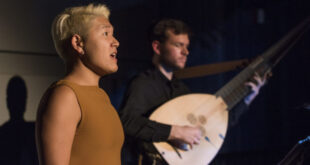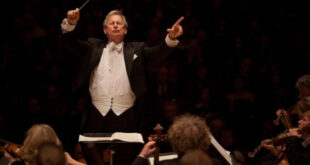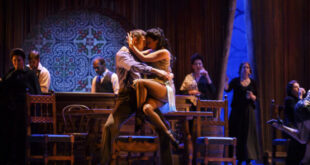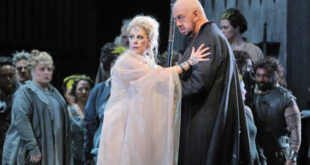 Puccini’s “Tosca” (1900) marks the third successive opera (after “Manon Lescaut” – 1893, and “La bohème” – 1896) that the composer worked with a subject that had achieved considerable popularity–in this case, the wildly successful 1887 play, “La Tosca,” by Victorien Sardou, written for Sarah Bernhardt. After the dismal failure of “Edgar” in 1889, which almost ended Puccini’s career, he had been told by a number of people that the main problem with the opera was not the music but the idiotic libretto by Ferdinando Fontana. Fortunately for Puccini, his publisher, Giulio Ricordi, also believed this and continued to support the young composer, against significant resistance from his company’s board of directors and in the face of rival publisher Edoardo Sonzogno’s great triumph with Mascagni’s “Cavelleria rusticana” and Leoncavallo’s “Pagliacci.”
Puccini’s “Tosca” (1900) marks the third successive opera (after “Manon Lescaut” – 1893, and “La bohème” – 1896) that the composer worked with a subject that had achieved considerable popularity–in this case, the wildly successful 1887 play, “La Tosca,” by Victorien Sardou, written for Sarah Bernhardt. After the dismal failure of “Edgar” in 1889, which almost ended Puccini’s career, he had been told by a number of people that the main problem with the opera was not the music but the idiotic libretto by Ferdinando Fontana. Fortunately for Puccini, his publisher, Giulio Ricordi, also believed this and continued to support the young composer, against significant resistance from his company’s board of directors and in the face of rival publisher Edoardo Sonzogno’s great triumph with Mascagni’s “Cavelleria rusticana” and Leoncavallo’s “Pagliacci.”
Many singers consider Puccini’s music to be the Mount Everest of vocal performance. You don’t have to have the biggest voice in the world, but you certainly have to sing this music perfectly, passionately and very intensely, to express its rhapsodic splendor in order to make your audience physically react with twinges all over and to feel chills racing up and down the spine–at the proper moments. With familiar stories such as “Manon Lescaut” (the most famous novel of the 18th century) and Dumas, “fils” tales of the bohemian life of the 19th century, it is not hard to grasp how a musical talent like Puccini’s could be brought to bear on a Romantic, sentimental audience. But “Tosca” is something different.
Now, surely “Tosca” is a Romantic piece, dripping with sentiment in several passages–as a literary work. As an opera, however, its musical and dramatic focus is on the title character, whose unmarried sexual affair is well known and used by the villain, who is a sexual sadist–and proud of it. He tortures the heroine’s lover, virtually in front of her, until she gives him some information. When she gives it to him to stop her lover’s torture, he condemns her lover to the gallows, offering to save him only if she will sleep with him. She agrees and his pleasure is enhanced because he is most turned on by hate. He pretends to order a phony firing squad execution and writes out a “safe conduct” order whereupon the heroine stabs him to death. The opera ends when the woman finds that the firing squad is the real thing, the villain’s body has been discovered and she commits suicide by throwing herself off the precipice of the Castel’ Sant’ Angelo.
Now how are you going to compose music for something like that?
The music that Puccini created for this Adults Only tale is some of the most famous and beautiful in all of opera. At the same time much of it is appropriately very dark and expressively violent. Critics didn’t like it at all. But the operagoers loved it! (This is somewhat reminiscent of the most popular Shakespeare play of his lifetime being “Titus Andronicus!”) It has been one of the most popular operas since it premiered in Rome in January 1900. I’m not sure what this says about me and other people, but we keep going back to see it again and again!
In our recent discussions of Italian opera we have touched on the irrelevance of precise historical accuracy in crafting a workable libretto. The truth is, if you’re creating a work of fiction, who cares how accurate the history is? But with “Tosca,” not only is the history accurate, but it also explains a great deal about the dramatic events–especially in the opera. The historical accuracy exists because the playwright, Sardou, was a history buff who set the story about two days after the Battle of Marengo, fought near Milan. At the time in Rome, which was controlled by royalists, it was thought that the Austrians had defeated Napoleon, hence that fantastic “Te Deum” (“Va, Tosca!”) and victory celebration.
The Battle of Marengo (June 14, 1800) was an incredibly significant battle in a number of ways. The Austrians were removed from northwest Italy for 15 years and it strengthened Napoleon’s grasp on power in France for years to come. It could be said that this battle, more than any other single event, paved the way for future Italian liberation and unity. Military history enthusiasts all know how this struggle seesawed back and forth all day until about 5 p.m., when the Austrians seemed to have decisively won the day. This is why (about two days later, the time it took for news to travel back then) the folks in Rome thought that a “Te Deum” was in order. But then Napoleon got reinforcements led by General Louis Desaix. As the legend goes, when asked by the Little Corporal what things looked like, the general (who would soon himself be killed in action) said something like: “This battle is totally lost. But there is still time to win another battle!”
There was another battle and the Austrians were routed. The news of this stunning reversal in political fortune has little bearing on the opera, however, except for the tenor’s high A-sharp in the second act. But overall, the story is propelled by the first (false) reports of an Austrian victory. In any discussion of the “absurdity” of the treatment of history in Italian opera, you may want to refer to “Tosca.”
****
Adding to the fantastic lineup of great Italian operas Lyric Opera has scheduled for the 2014-15 season is a two-cast production of “Tosca.” I personally will try to catch a performance of Mark Delavan as Scarpia. Folks, there is simply no better baritone in the world than this guy, and we’re incredibly lucky to have him in Chicago in one of the great baritone roles!
ARTISTS
Tosca — Tatiana Serjan (Jan. 24-Feb. 5) and Hue He (Feb.27-Mar. 14)
Cavaradossi — Mischa Didyk (Jan. 24-Feb. 5) and Jorge de Leon (Feb.27-Mar. 14)
Scarpia — Evgeny Nikitin (Jan.24-Feb. 5) and Mark Delavan (Feb. 27-Feb. 5)
Conductor — Dmitri Jurowski
Director — John Caird
Designer — Bunny Christie
PERFORMANCE DATES
January 24, 27, 30
February 2, 5, 27
March 3, 8, 11, 14
For tickets or more info. visit www.lyricopera.org or call 312-827-5600.
 Fra Noi Embrace Your Inner Italian
Fra Noi Embrace Your Inner Italian






